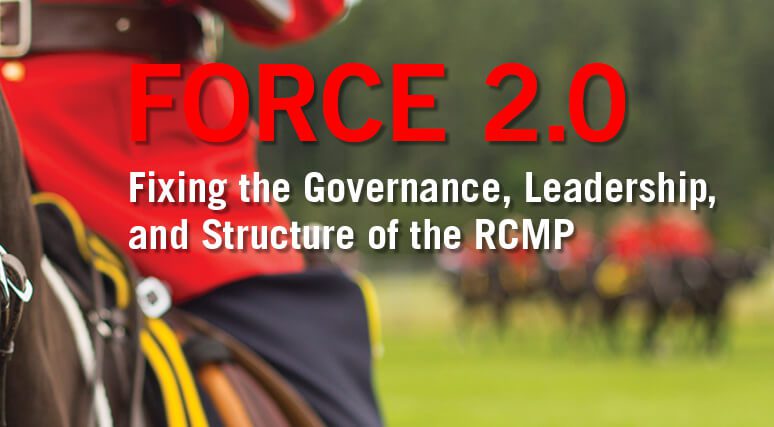
Leuprecht lays out a plan for successfully implementing civilian oversight at the RCMP in a new paper for the Macdonald-Laurier Institute
OTTAWA, Sept. 7, 2017 – Reform of Canada’s national police force, the Royal Canadian Mounted Police, has been slow and elusive. Class-action lawsuits, questions over leadership and equipment, recruitment shortfalls, complaints about compensation, and the Force generally being stretched too thin on too many fronts are a drag on the RCMP’s reputation.
Every few years a new Commissioner arrives with a mandate to “fix” the problems but soon departs with nothing to show for it.
Christian Leuprecht, a respected thought leader on policing issues, lays out a comprehensive solution for solving the problems the RCMP is facing in a new paper for the Macdonald-Laurier Institute.
A supplementary Annex to this paper has also been published, compiling recommendations from reports made, or relevant to, the RCMP over recent decades.
“The question is not just what kind of reform is necessary, but why changes have been so slow and difficult in coming – and what conditions are necessary to invigorate and sustain reform,” writes Leuprecht.
“The RCMP needs structural reform if we want to improve its performance and strengthen the professional aspects of policing while building the confidence that is required and expected of Canada’s federal police agency.”
To read the full paper, titled “Force 2.0: Fixing the Governance, Leadership and Structure of the RCMP, click here.
Leuprecht reinforces A Civilian Board of Management as a starting point.
This, says Leuprecht, would challenge and validate the priorities the Force has identified, liaise with the Minister and senior bureaucracy in a more systematic way, and validate the RCMP’s budgetary “asks.”
By itself, however, A Civilian Board of Management will prove insufficient to effect change.
It will need to be complemented by a seasoned civilian professional with long-standing expertise in the federal government to liaise with the Minister and senior federal bureaucracy: a Deputy Minister (DM) equal in rank to the RCMP Commissioner. Together, this “diarchy” arrangement would reinvigorate and modernize the RCMP’s governance, administration, and leadership.
Leuprecht says the following recommendations will help make any transition for the RCMP more likely to succeed:
- Oversight by a Civilian Board of Management to forge a strategy that bolsters the RCMP’s leadership, professionalism, and competence. An independent oversight/management group forestalls the potential for abuse that would arise from greater direct political involvement in the RCMP.
- Split operations and administration into a diarchy and install a DM equal to the Commissioner. Based on the Canadian Armed Forces/Department of National Defence precedent, that may require the RCMP to be split into two legal entities and to clarify the relationship between the RCMP and Public Safety Canada, and the RCMP’s DM and Public Safety Canada’s DM.
- Demilitarize the RCMP by developing personnel, deployment, employment, and career models that transform the RCMP from a paramilitary vocation into a law enforcement profession. This will help professionalize functions, enable a shift from a command to a leadership culture, build an effective system to convert junior members into leaders, establish strategic leadership capacity, and innovate career models.
- Bind the Commissioner to follow the direction/finding of the current and future review bodies in statutorily defined circumstances and establish sustained monitoring of reform implementation. This could be done possibly through an external audit but preferably internally through a Minister’s Monitoring Committee.
These recommendations ensure that efforts to reform the RCMP will prove successful and sustainable, writes Leuprecht.
“A Civilian Board of Management and co-equal DM provides the best way to confront the structural challenges facing the RCMP,” writes Leuprecht.
“For Canada’s federal police force, failure is not an option.”
***
Christian Leuprecht is Matthew Flinders Fellow in the Centre for Crime Policy and Research at the Flinders University of South Australia, on leave from the Royal Military College of Canada where he is a Professor of Political Science. He is Munk Senior Fellow at the Macdonald-Laurier Institute and cross-appointed to the Department of Political Studies and the School of Policy Studies at Queen’s University where he is also a fellow of the Institute of Intergovernmental Relations and the Queen’s Centre for International and Defence Policy.
The Macdonald-Laurier Institute is the only non-partisan, independent national public policy think tank in Ottawa focusing on the full range of issues that fall under the jurisdiction of the federal government.
For more information, please contact:
Brett Byers-Lane
Communications and Digital Media Manager
613-482-8327×105
brett.byers-lane@macdonaldlaurier.ca




